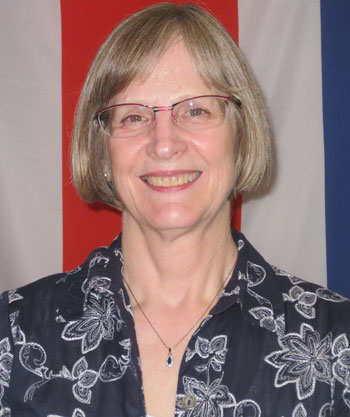Sue Otto is pleased to have the opportunity to teach every student in the Foreign Language Acquisition Research and Education (FLARE) program. As director of the Language Media Center, Otto is the only instructor for the multimedia and language acquisition course -- a requirement for students in the program.
Because she teaches all FLARE students, Otto is well-suited for her new role as a co-director of FLARE in fall 2011. She genuinely enjoys interacting with FLARE students – a small group of about 20.

Through her research, she examines technology’s influence on how students learn a language, as well as how educators can use technology most effectively.
Otto and other researchers have found that learning a language is a highly individualized process and generalized statements on what works are difficult to make. The technology available for language learning has changed rapidly and radically in recent years, and the tech tools schools can afford to offer students vary widely, as well. Otto believes that the technology itself is not the most critical factor.
Rather, it is the ways in which professors and students utilize it to enhance the language learning experience that makes the most significant difference.
“The form that the technology takes just doesn’t matter that much because it is sure to change,” she said.
According to Otto, offering learning opportunities in multiple forms can help students learn better. For example, delivering information through complementary channels –using visual and auditory means simultaneously– can help them retain the information. Students can select from various media that best fit their learning style. Given the benefits of such an individualized approach, Otto says, educators can concentrate on offering a variety of learning tools rather than on finding one single, definitive teaching methodology for all students.
As a student, Otto aspired to become a Spanish teacher or professor, which she did for a year before pursuing a graduate education at the University of Iowa. She became interested in technology’s role in language education as she was writing her dissertation.
The technology has evolved significantly since Otto started her research. When she began researching, she worked with main-frame computers. Displaying foreign characters on the screen was a major challenge and multimedia wasn’t a buzzword in anyone’s vocabulary. Now, Otto finds that advanced technology helps reinvigorate classroom tools that are older but still effective.
“We still use all the media that I grew up with, including audio, video, text, and graphics,” Otto said. “But now it’s all delivered in digital form on computers.”
However, despite an ever-growing portfolio of technology-based teaching tools, Otto says students should still expect to study hard in order to succeed in language acquisition'
“The more choices you can give people, the better the learning experience,” she said. “However, having more choices comes with a greater responsibility for the learner.”